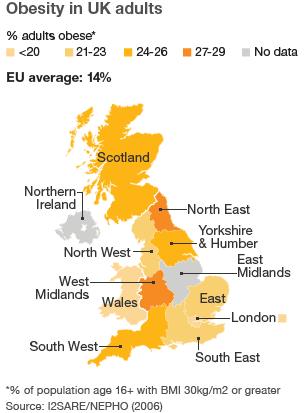UK among Europe's unhealthiest nations, report suggests
- Published

The UK is one of the unhealthiest nations in Europe for some health indicators, data suggests.
Figures from the Association of Public Health Observatories reveal the UK is the fattest EU member and has one of the highest rates of teen pregnancies.
The UK also performs badly on female cancer survival and infant deaths.
But life expectancy figures in the UK are slightly better than for EU counterparts and the nation also excels at treating heart disease.
And our early action on smoking has had a very positive impact on health outcomes, the report authors say.
They compared all regions across 27 countries in Europe using 37 health indicators in 2006.
Hot spot
The UK as a whole scored particularly badly on obesity, being the fattest nation of all.
And within the UK it was the West Midlands that had the highest percentage of obese adults at 29% - double the EU average of 14% and much higher than the 19% rate seen in Greater London.
The UK's female death rates from cancer were also among the worst in Europe.
Deaths in south-east England were the highest at 185 per 100,000, followed by Scotland at 179 per 100,000 and north-east England at 174. This compares with the European average of 139.5 per 100,000.
All parts of the UK had more teenage mothers than in most other European countries - but the North East of England came out the worst.
The researchers acknowledge the picture may have changed slightly since the data was collected, but they say their snapshot should be a warning to public health experts.
Dr Claire Bradford and Professor John Wilkinson, who compiled the report, said the information could help the UK improve its track record.
Dr Bradford said: "This type of data allows us to compare not just between countries but within countries and to look at what is going well and what is not.
"People that are able to influence which way we are going as a nation should look at this to decide on priorities and actions.
"Our problem with obesity might be a good place to start."
Commenting on the data, public health expert, Professor Sir Michael Marmot said the report highlighted "stark differences" in health across the EU.
"The causes of health inequalities are socially determined," he said.
"The behaviours that lead to obesity and teenage pregnancy, for example, arise from social conditions.
"This knowledge informs what we as a society can do at a local, regional, national and international level to create the conditions for greater health equity."
'Appalled'
Professor Steve Field of the Royal College of General Practitioners said: "I'm appalled by the figures and feel ashamed as a GP working in the West Midlands that this area has the highest percentage of obese adults in Europe.
"Obesity is a major problem and predictor of ill health throughout a patient's life, causing serious illnesses.
"I hope we will be able to do more in the future to get people to take responsibility for their own health and take more exercise and eat sensibly."
A Department of Health spokesman said: "The government has made it clear that tackling health inequalities is a priority as part of its commitment to fairness and social justice.
"Action to tackle health inequalities is at the centre of our approach to public health.
"We will aim to use the least intrusive approach necessary to achieve the desired effect.
"We will seek to use approaches that focus on enabling and guiding people's choices wherever possible."
Dr Tony Goldstone, an obesity expert at London's Hammersmith Hospital, explains what fat is